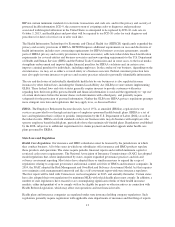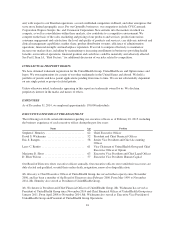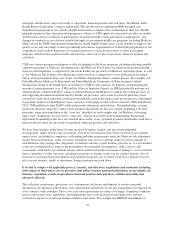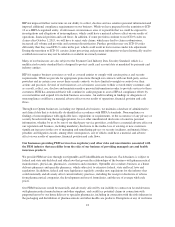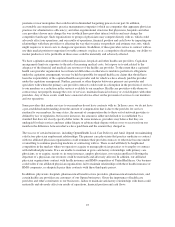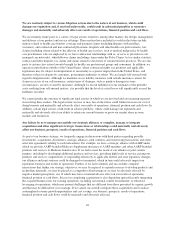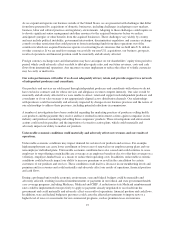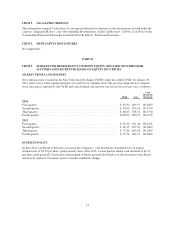United Healthcare 2014 Annual Report Download - page 23
Download and view the complete annual report
Please find page 23 of the 2014 United Healthcare annual report below. You can navigate through the pages in the report by either clicking on the pages listed below, or by using the keyword search tool below to find specific information within the annual report.As a result of our participation in various government health care programs, both as a payer and as a
service provider to payers, we are exposed to additional risks associated with program funding,
enrollments, payment adjustments, audits and government investigations that could materially and
adversely affect our business, results of operations, financial position and cash flows.
We participate in various federal, state and local government health care benefit programs, including as a payer
in Medicare Advantage, Medicare Part D, various Medicaid programs, CHIP and our TRICARE West Region
contract with the DoD, and receive substantial revenues from these programs. Certain of our Optum businesses
also provide services to payers participating in government health care programs. A reduction or less than
expected increase, or a protracted delay, in government funding for these programs or change in allocation
methodologies, or, as is a typical feature of many government contracts, termination of the contract for the
convenience of the government, may materially and adversely affect our results of operations, financial position
and cash flows.
The government health care programs in which we participate generally are subject to frequent changes,
including changes that may reduce the number of persons enrolled or eligible for coverage, reduce the amount of
reimbursement or payment levels, reduce our participation in certain service areas or markets, or increase our
administrative or medical costs under such programs. Revenues for these programs depend on periodic funding
from the federal government or applicable state governments and allocation of the funding through various
payment mechanisms. Funding for these government programs depends on many factors outside of our control,
including general economic conditions and budgetary constraints at the federal or applicable state level. For
example, CMS has in the past reduced or frozen Medicare Advantage benchmarks and additional cuts to
Medicare Advantage benchmarks are possible. In addition, from time to time, CMS makes changes to the way it
calculates Medicare Advantage risk adjustment payments. For 2014, CMS asked plans to submit additional
information indicating whether or not medical conditions were diagnosed in a clinical setting. CMS has indicated
that it will publish further guidance on the treatment of risk adjustment data in early 2015. Although we have
adjusted members’ benefits and premiums on a selective basis, ceased to offer benefit plans in certain counties,
and intensified both our medical and operating cost management in response to the benchmark reductions and
other funding pressures, these or other strategies may not fully address the funding pressures in the Medicare
Advantage program. In addition, payers in the Medicare Advantage program may be subject to reductions in
payments from CMS as a result of decreased funding or recoupment pursuant to government audit.
Under the Medicaid managed care program, state Medicaid agencies seek bids from eligible health plans to
continue their participation in the acute care Medicaid health programs. If we are not successful in obtaining
renewals of state Medicaid managed care contracts, we risk losing the members that were enrolled in those
Medicaid plans. Under the Medicare Part D program, to qualify for automatic enrollment of low income
members, our bids must result in an enrollee premium below a regional benchmark, which is calculated by the
government after all regional bids are submitted. If the enrollee premium is not below the government
benchmark, we risk losing the members who were auto-assigned to us and will not have additional members
auto-assigned to us. In general, our bids are based upon certain assumptions regarding enrollment, utilization,
medical costs, and other factors. In the event any of these assumptions is materially incorrect, either as a result of
unforeseen changes to the programs on which we bid, or submission by our competitors at lower rates than our
bids, our results of operations, financial position and cash flows could be materially and adversely affected.
Many of the government health care coverage programs in which we participate are subject to the prior
satisfaction of certain conditions or performance standards or benchmarks. For example, as part of Health
Reform Legislation, CMS has a system that provides various quality bonus payments to plans that meet certain
quality star ratings at the local plan level. The star rating system considers various measures adopted by CMS,
including, among other things, quality of care, preventative services, chronic illness management and customer
satisfaction. Beginning in 2015, plans must have a rating of four stars or higher to qualify for bonus payments. If
we do not maintain or continue to improve our star ratings, our plans may not be eligible for quality bonuses and
we may experience a negative impact on our revenues and the benefits that our plans can offer, which could
21




